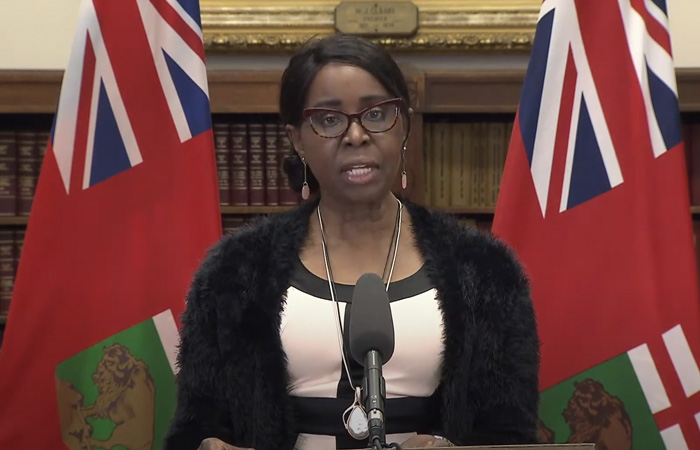The Manitoba government has signed agreements and put new initiatives in place to build capacity for women’s health, diagnostics and spine surgery since the launch of the Diagnostic and Surgical Recovery Task Force in December.
“The task force quickly built capacity in some key areas as we build a stronger and more responsive system here in Manitoba,” said Health Minister Audrey Gordon. “Providing care close to home is our priority and we know many people have waited far too long, which affects their health and quality of life. Today, we are highlighting new solutions that will help hundreds of Manitobans get the care they need sooner.”
The province is developing an agreement with Maples Surgical Centre and other local partners to increase gynecology surgeries. Nearly 3,000 women are currently waiting for care and almost two-thirds of these procedures can be done through day surgery. This program will begin in early February and significantly decrease the wait for many patients, noted the minister.
In Manitoba, the screening tool currently used for colon cancer requires the client to have an endoscopy to confirm their diagnosis. This must be done in an operating room, which requires staffing and other resources. Manitoba is shifting to fecal immunochemical test screening, which provides more accurate results and also reduces the need for endoscopic procedures. This will provide more timely diagnosis and support better outcomes for individual clients. It will also free up operating room space for other procedures by decreasing the number of endoscopies by approximately 10 to 15 per cent per year once fully implemented.
“The task force has identified some early opportunities to increase surgical and diagnostic capacity in Manitoba by expanding partnerships with trusted providers and implementing best practices that provide excellent patient care,” said Dr. Peter MacDonald, chair of the task force’s steering committee. “This is just the beginning. Work continues on many other fronts to build capacity here at home and we will have more important updates for Manitobans in the weeks ahead.”
The Manitoba government is also preparing a plan to train and hire up to 13 new anesthesia clinical assistants (ACA) positions across the province over the next three years. Anesthesia is fundamental to effective, safe and efficient medical procedures. ACAs allow anesthesiologists to increase their efficiency by being able to delegate and observe care simultaneously for more than one patient. This investment will double the number of ACAs currently working in Manitoba. ACAs are critical members of the surgical team, helping to provide safe and efficient care to patients, noted the minister.
The province is also working on an agreement with Sanford Health in Fargo, North Dakota to provide spinal surgeries as a part of Manitoba’s Out-of-Province Medical Referrals program. This measure will help reduce the wait-list for Manitobans as the province builds its own capacity. Services will be offered later this year as capacity allows at Sanford Health Fargo. Eligible individuals will be referred by their care provider, typically for conditions such as spinal stenosis and chronic degenerative disc disease.
“Building surgical capacity requires the right mix of staff and space,” said Dr. Ed Buchel, surgical lead on the task force steering committee. “We need all of these in place to effectively reduce wait-lists for Manitobans and we are making good progress in these critical areas. Shifting some surgeries to Fargo is a temporary measure, which will give patients the option to seek care with a well-respected surgical team. This will be voluntary, with eligible costs covered by the province and coordinated with the patient’s care team here at home.”
One of the significant challenges the task force has identified is the lack of a verified, centralized wait-list for most diagnostic and surgical procedures. Beginning in February, the task force will reach out to hundreds of patients to get a more complete picture of who is waiting for care, the procedures required and other key information. This will help inform the task force’s priorities as well as its future updates to Manitobans, including an online dashboard expected to launch in the coming months.
“To Manitobans who are on a wait-list for a diagnostic or surgical procedure, I want to say this: more good news is coming,” said Gordon. “The task force project team is focused on achieving results that bring more timely care for all of us. They are guided by local experts who know our health-care system and Manitobans’ priorities. These improvements are just the beginning, as we build capacity and Manitoba-made solutions.”
The minister announced the creation of the Diagnostic and Surgical Recovery Task Force in December 2021. The work of the task force builds on existing provincial investments and measures to reduce wait-lists and support access to care. The province has already invested more than $8.8 million in agreements with public and private service providers, resulting in a net increase of more than 9,000 procedures completed in 2021-22 including cataract surgery, echocardiography, hernia surgery, pediatric dental surgery, spine surgery and endoscopy.
For more information about the Diagnostic and Surgical Recovery Task Force, visit gov.mb.ca.




